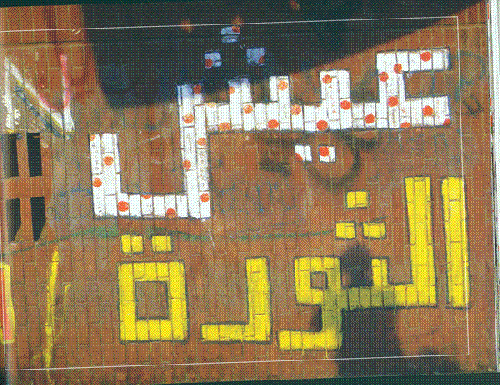Reflecting on the state of political Islam in the post-1979 world, in Stages of Islamic Revolution (1996), Kalim Siddiqui looks for guidance to Muhammad's political legacy:
*Islam (the world means "peace') does not shrink from conflict; however, war is a last resort, and must have a higher moral purpose, not territorial or economic gain, but for defense of the umma. When the Muslims emigrated to Medina, the Quraish invaded Medina to prevent it from becoming established as an Islam state, but this actually helped consolidate the political and military power of Islam there and subsequently over the Arab peninsula. (Think: Blowback, e.g., the Iraqi invasion of Iran and ongoing threats by US-Israel to invade Iran strengthened the Iranian revolution.)
*Establishing Islamic rule requires an open movement approach which gathers all on board, as Muhammad established in setting up Medina as the first Islamic state. The political party approach is divisive, and gets bogged down by early compromises and deals with existing political forces. (Recall Iran after the revolution when liberal Prime Minister Mehdi Bazargan and President Abolhassan Banisadr objected to the anti-imperialist course of the revolution, the former resigning in November 1979, the latter plotting a new uprising and forced to flee abroad in 1981. Also, the unraveling of the recent revolutions in Tunisian and Egyptian, where liberals similarly split and then worked to sabotage the revolution.)
*In an Islamic state the leadership must be muttaqi (pious) and the citizens must pledge allegiance based on taqwa (piety) for the system to dispense justice. The system of state structures of the previous exploitative state must be replaced. (Think: Khomeini's velayat e-faqih, the Revolutionary Guards, Jihad for the Reconstruction of Life, the Baseej (mobilization) vs the paralysis in post-revolutionary Tunisia and Egypt.)
As in Iran, in post-revolutionary Egypt, the initial mass movement for change quickly unraveled--secularists such as Nasserist Hamdeen Sobahi, and liberal Mohamed ElBaradei, initially cooperated with the Islamists before turning against them in the name of nationalism, not grounding their actions in taqwa. The Islamists proved helpless, faced with an army in the financial clutches of Washington, which in league with the judiciary and (now 40+) western-style political parties, stripped the Islamist government of meaningful power, sabotaged the economy, and carried out the coup approved in Washington, obviating the need for a messy invasion.
The support of the newly uncorrupt government by the vast majority provided a brief window of justice (a doubling of the minimum wage, new freedoms for Islamists to organize grassroots initiatives to help the poor and encourage a revival of the faith, honest elections), despite the active sabotage of the old state structures, which the coup abruptly ended. Secular leaders, watching as the "soft state' now under the direction of the Islamists became less and less relevant, mounted a hysterical campaign to overthrow the popular government, abandoning the revolution and calling on the old guard to take back control through brute force to end all pretense to justice.
Qutb's legacy
Siddiqui approves of Sayyid Qutb's rejection of nationalism in Milestones (1964) and his call for broad-based revolution, leading to the overthrow of the imperialist order. But the revolution in Iran was not Qutbian.
While nationalism was not a major force in overthrowing the Shah (who had tried to whip up a Persian Empire chauvinism to counter Islam), the unity of the post-revolutionary state in the face of invasion certainly relied on a gut patriotism. And the original uprising was largely peaceful (more like a general strike), and succeeded only when troops defected in large numbers, refusing to shoot the demonstrators.
The Egyptian coup worked precisely because of the strident appeal to nationalism, and accusations that the MB was not concerned enough about Egyptians, more interested in liberating al-Quds (Jerusalem). Ironically, the coup united people outside Egypt in condemning it, while it split Egyptians largely based on the appeal of nationalism.
Yes, Muhammad fought against narrow tribal identity and racism, but a benign nationalism can appeal to ethnicity and culture, and is not necessarily based on imperialism, exploitation, chauvinism, racism.
Siddiqui's militant analysis was appropriated by the al-Qaeda types, who he dismissed in 1996 as "pockets of obscurantist conservatism", who also denounce nationalism (though they are noted for their Saudi/ Arab chauvinism), belittle western-style elections, and spurn a broad alliance with leftists/ liberals. The attacks by the Egyptian Islamic Society and Islamic Jihad in Egypt in the 1990s resulted in the deaths of 800 Egyptian policemen and soldiers, rebels, and civilians including dozens of tourists.
While there is a grudging respect for al-Qaeda-type martyrs among the Sunni masses, this mostly random killing of civilians (mostly Muslims) is antithetical to Islam, and has acted time and again to justify brutal crackdowns under Mubarak and today. Other conflicts of the 1990s involving Islamists (Bosnia, Kashmir, Afghanistan, even Egypt) have not led to any clear victories a la Iran.
On the contrary, the Muslims in Bosnia and Kosovo ended up welcoming the imperialists as their "saviors'; Kashmir is draped in the Pakistani flag; and the "pockets of obscurantist conservatism" took control in Afghanistan and continue to insinuate themselves into legitimate struggles in such places as Algeria and Mali. They are inspired not by the intent of the Quran, but by their mortal enemies, the imperialists, who made terrorism against civilian populations the bedrock of 20 th century totalitarian rule. In a sense, the Bin Ladens are the dying gasp of the imperialist order, sharing the stage with their American and Saudi nemeses. The al-Qaeda types took Qutb's 19 th century anarchist-like revolutionary strategy to a fatal extreme, and have compromised more thoughtful efforts at Islamic renewal. (Think: Baader - Meinhof multiplied "n' times around the world.)
Towards a global Islamic movement
(Note: You can view every article as one long page if you sign up as an Advocate Member, or higher).






